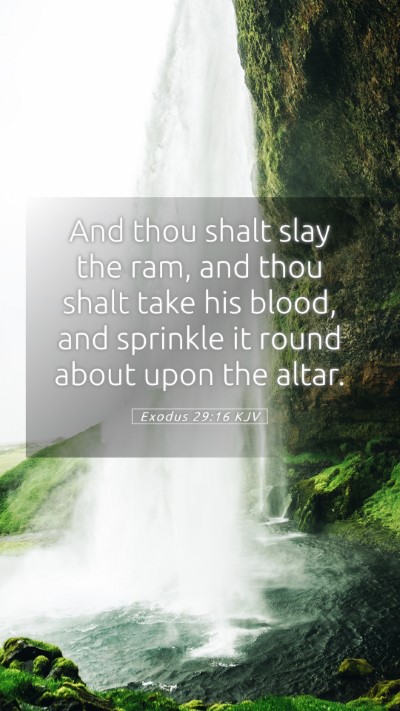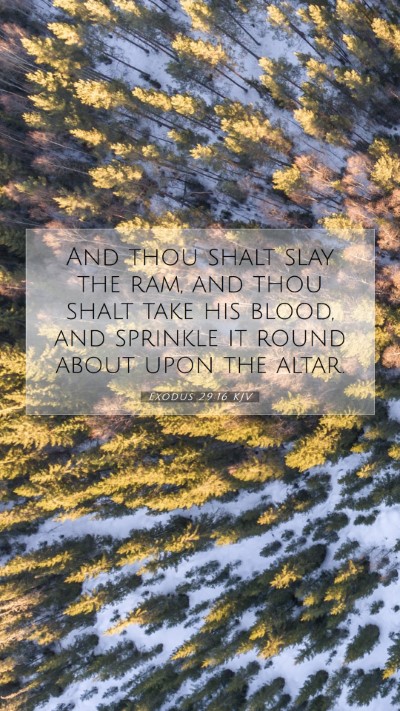Understanding Exodus 29:16
Exodus 29:16 states, "And you shall kill the ram, and you shall take its blood and throw it against the altar on all sides."
Bible Verse Commentary
This verse is part of the instructions concerning the consecration of Aaron and his sons for the priesthood. The act of sacrificing the ram is a pivotal point in the ceremonial observance, highlighting the means through which God establishes a covenant with His chosen leaders.
Significance of the Sacrifice
The sacrifice symbolizes atonement, illustrating how life must be offered to maintain a relationship with God. The blood used signifies the purification necessary to approach the holy. As noted in Matthew Henry's Commentary, the ritual underscores the seriousness of sin and the need for a mediator between God and His people.
The Blood and the Altar
The act of throwing blood against the altar is deeply symbolic. Albert Barnes explains that the altar represents the presence of God and the blood signifies life. Therefore, splattering the blood around the altar was both a rite of purification and a demonstration of the life being offered to God. This act foreshadows how Jesus' sacrifice ultimately fulfills the need for atonement.
Historical Context
In the ancient Israelite context, shedding blood was central to the sacrificial system. Adam Clarke elaborates that these instructions were established at a time when God was outlining His relationship with Israel, highlighting their requirement for holiness and relationship through sacrifice.
Bible Verse Interpretations
Understanding Scripture requires looking at both the immediate and broader contexts. Exodus 29:16 serves not only as a historical account but also provides profound insights into Biblical principles concerning worship, sacrifice, and intercession.
Contextual Analysis
- The Role of the Priest: This verse signifies the responsibility of the priests to mediate between God and the people.
- Holiness of Worship: The manner of sacrifice underscores that approaching God requires a reverential attitude and acknowledgment of one’s sinfulness.
- Foreshadowing Christ: The ritual acts foreshadow the ultimate sacrifice of Christ, highlighting the theme of redemption throughout the Bible.
Applying Bible Verses to Daily Life
While Exodus 29:16 details an old covenant practice, its principles can guide modern believers.
- Recognizing Our Need for Atonement: Just as the ancient Israelites required sacrifices, today's believers recognize the need for Christ's atoning work.
- Understanding the Seriousness of Sin: The ritual of sacrifice reminds us of the weight of our sins and the cost of grace.
- Engaging in True Worship: True worship involves sacrifice—whether it’s our time, resources, or service to God and others.
Related Bible Verses
For a deeper understanding, consider these cross-references related to Exodus 29:16:
- Leviticus 4:25-30: Details of sin offerings.
- Hebrews 9:22: The importance of blood in the covenant.
- Romans 12:1: Offering our lives as living sacrifices.
Bible Study Resources
For those engaged in Bible study groups or looking for online Bible study tools to delve deeper into Scripture analysis and historical contexts, it might be beneficial to utilize:
- Bible study guides to understand the sacrificial system.
- Online Bible study courses that focus on Old Testament prophecies and symbols of sacrifice.
Conclusion
Exodus 29:16 is more than an ancient ritual; it encapsulates themes of sin, sacrifice, and the need for redemption that resonate throughout Scripture. Delving into the meaning of Bible verses like this requires a blend of historical context, spiritual significance, and practical application, drawing believers closer to God’s word.


